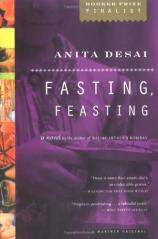Critical Praise
"Certain novels seduce us with invitations to visit distant places and participate vicariously in the thrill of exploration. Others manage to sensitize us to some aspect of our ordinary lives that we may never have fully appreciated. Set mostly in India amid a colorful milieu of arranged marriages, bride murders and ascetic ashrams, Anita Desai's new novel, 'Fasting, Feasting' which was a finalist for the 1999 Booker Prize would seem to fit into the former category. But soon enough we realize we're mistaken. For beneath its trappings of foreign customs and cultures, the novel's claustrophobic domesticity begins to look very familiar...What distinguishes Desai's novel from countless other depictions of airless and repressive households is the subtle and original way in which she makes us understand how much of our lives is encoded in and determined by tiny, repetitive, deceptively trivial decisions about what we will and won't eat...As in her previous novels, Desai employs a rich and subtle palette to convey her crisp, unsentimental view of character and behavior. 'Fasting, Feasting,' makes the apparently exotic destinies of Uma, Arun and their family seem as universal, as vital and familiar, as the food on our plates. "
——The New York Times
"Anita Desai's latest novel is a poignant, penetrating look at the travails of the eldest daughter and the only son of a strict couple in a provincial Indian town. In Uma, the aging, oppressed daughter No. 1, Ms. Desai ('Journey to Ithaca,' 1995) has created a marvel. Bullied by her parents, whom she thinks of as a single unit ('MamaPapa'), her eyes failing and her hair graying, Uma finds pleasure in small things: a hoard of old Christmas cards she treasures for their garish decorations, banal tea parties at the home of a Baptist missionary, volunteer work at a convent school she attended before her parents, hoping to marry her off, yanked her out. Moments of unexpected visits from two relatives: her odd, exuberant cousin Ramu, who, in a memorable episode, takes her out to dinner and gets her tipsy; and an older relative, Mira masi, a perpetual pilgrim who lugs icons around the countryside. The closest Uma gets to true contentment is when she accompanies Mira masi to a remote ashram -- indeed, she would stay there forever, but her parents send her brother and cousin to bring her home. About the only time Uma feels liberated is when she's under water, unable to swim but somehow sprung loose in the black depths: 'It was not fear she felt, or danger. Or rather, these were only what edged something much darker, wilder, more thrilling, a kind of exultation it was exactly what she had always wanted, she realized... "
——Gabriella Stern The Wall Street
Journal "Fasting, Feasting posits food as a metaphoer for emotional sustenance. Everything centers around food. Desai, who teaches writing at the Massachusetts Institute of Technology, tells the story with lapidary prose, creating intimate scenes as detailed as Indian miniature paintings. An accumulation of small details as steady and fine as drops of small rain create and eventual flood that drowns the happiness and the hopes of both Arun and Uma. "
——The Seattle Times
—



